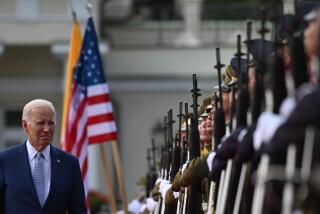Still a Chance
- Share via
As they left Iceland, President Reagan’s advisers, many near exhaustion after sleepless hours that promised a breakthrough in arms control but left both sides empty-handed, brooded over what might have been. But the weekend summit meeting has come and gone and cannot be recalled or rewritten. What remains is what might yet be.
What might have been was an agreement, one half of which would have cut both American and Soviet nuclear forces by 50% in the next five years and wiped them out altogether at the end of a decade. The other half would have kept the President’s Star Wars genie bottled up inside laboratories during that time.
Most American scientists would have jumped at the deal, as would we and as the President should have done. Most scientists doubt that the Star Wars defense system which the President insists will some day throw a missile-proof shield over this country can be built in less than a generation, if ever, and then only at a cost in the hundreds of billions of dollars. By eliminating the Soviet arsenal of strategic weapons, the bargain, if it worked, would have destroyed more Soviet missiles than Star Wars could ever hope to do, and at a fraction of the cost, in dollars and in wear and tear on the nerves of American allies.
What might yet be is careful negotiations at Geneva, with days and weeks to ponder proposals and counterproposals rather than the minutes and hours available at Reykjavik. They would start at the point that Reagan and Soviet General Secretary Mikhail S. Gorbachev had reached before they said goodby. Both leaders indicated that talks will go on. “I’m still optimistic,” Reagan said in a television address Monday evening. “Let us not panic,” said Gorbachev as he headed back to Moscow.
But future negotiations will be no picnic. As nearly as anyone on the outside can tell, Reagan and Gorbachev went to Iceland to sound out the limits to which each was willing to go in order to give some guidance to their negotiators.
What happened there may well reflect the outer limits for both men, outer limits that were not new and should not have come as a surprise. The last time he addressed Star Wars publicly before the Iceland meeting, Reagan said, “Our response to demands that we cut off or delay research and testing is: No way.” His language may have been different at Reykjavik, but his message was the same.
As for Gorbachev, his parting remarks were in line with what he told Reagan during last November’s summit meeting: Star Wars would not necessarily be a defensive weapon but could as easily be an offensive weapon, attacking Soviet targets from space.
The Soviet leader said that as they were saying goodby, Reagan asked him, “Why are you so intransigent” over one word, testing? It was not just one word, Gorbachev said he replied, it is “what the U.S. Administration really intends.”
Still, the Reykjavik weekend provides a place to start thinking of ways to break the impasse. Gorbachev says the Soviet offer to cut its long-range missile force in half over the next five years will remain on the bargaining table in Geneva. A vastly reduced offensive threat should mean a vastly reduced defensive system. A reduced defensive system, more precisely described, might well be easier to negotiate than the grandiose, but imprecise, schemes that the Administration has promoted in public as part of an effort to keep the Star Wars budget growing.
The fact that the Administration has had so much trouble explaining just what Star Wars would look like is a major source of Congress’ skepticism about the project. That skepticism itself will be a factor in determining the future course of arms control negotiations. Even before Reykjavik, Congress was moving to hold down the budget for Star Wars research to help reduce the federal deficit. A number of members were talking Monday about giving the program even closer scrutiny in the future.
The failure to come away from Reykjavik with something in writing that would slow down the arms race is a setback, but it is not the end of arms control negotiations. As long as the President and the General Secretary do not lose each other’s telephone numbers, there is reason to hope that they will find a way to talk themselves out of the corners they talked themselves into at Reykjavik.
More to Read
Sign up for Essential California
The most important California stories and recommendations in your inbox every morning.
You may occasionally receive promotional content from the Los Angeles Times.













